Mass Effect 2 Review
When it first arrived back in late 2007, Mass Effect instantly became one of my favorite RPGs in recent memory. Returning to it to prepare myself for Mass Effect 2 was somewhat disappointing though, as the game's shortcomings - technical and otherwise - are surprisingly glaring a mere three years on in 2010.
Praise the RPG gods at Bioware, then, for Mass Effect 2 - a game that strives to annihilate any disappointing aspect of the first game, and rework even those areas that were merely good and not great. The result is something truly special, incredibly cinematic and - most exciting of all - a tantalizing look at a potential future for the Western-made RPG as a whole.
The narrative of the sequel takes place several years after the exciting conclusion to the first game, picking up from your save-game if you have one and bringing across your custom-made Commander Shepard and all the important story decisions made throughout the first game.
The game has a shocking opening - which we won't talk about here - and after that Shepard will find him or herself working for the pro-human organization Cerberus, who are trying to unravel the mystery of attacks on human colonies that leave them empty and deserted with all the people within gone forever.
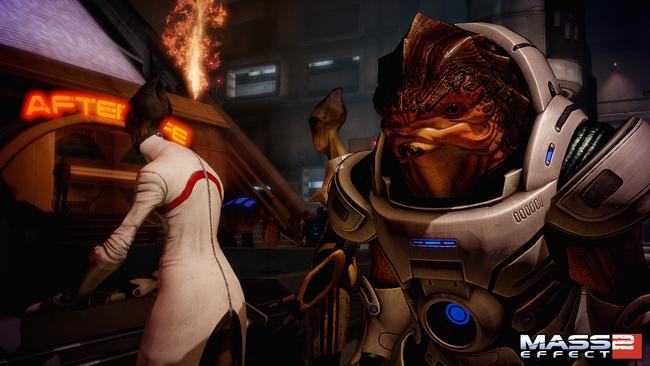
At the head of Cerberus is the 'Illusive Man' - voiced wonderfully by Martin Sheen - who'll be dishing out missions to you in the name of protecting the human race.
Whereas the first Mass Effect title was based around scouring several large storyline planets for antagonist Saren, Mass Effect 2 is actually based around Shepard's search for an elite team who will then head into dangerous uncharted areas of space to track down the missing humans.
For a large portion of the game you'll actually be directing your ship around the galaxy in search of dangerous, skilled and sometimes psychopathic allies who will be ideal candidates for your mission - which most don't expect Shepard and his crew to survive.
Recruiting each potential squad member isn't always an easy cast, and with a cast much larger than the original Mass Effect there's a lot more ground to be covered in order to recruit them all. Once you've done that you'll have to also try to gain their trust, as relationships with your party will play a large role in the outcome of the finale.
The finale of Mass Effect 2 has been promoted heavily by Bioware, as the entire premise of the game is preparing for this so-called suicide mission. It's true that the game can end with Shepard's mission a success but with the team wiped out - and it's up to you to try to minimize the casualties and save your team so they'll still be around for Mass Effect 3.
Choices you make throughout the game will heavily affect the way the game ends - if you shun a party member they may turn their back on you during the finale, and failing to head in properly equipped will have dire consequences on that all-important final mission.
This whole idea is cleverly executed by Bioware, as it makes every single side quest in the game feel important. Some quests will help you upgrade the weaponry on your ship, making cutscene-based space battles in the finale go better, while better equipment will of course make battles easier for you as a player.
All of this plays into Bioware's mantra of choice-based gameplay, driven by branching dialogue trees that will have a lasting effect on the storyline of the game. Mass Effect 2 sees the return of the dialogue wheel which appears during dialogue to allow you to select a general gist of your response, cutting out the awkward silence during conversations while you select a response.
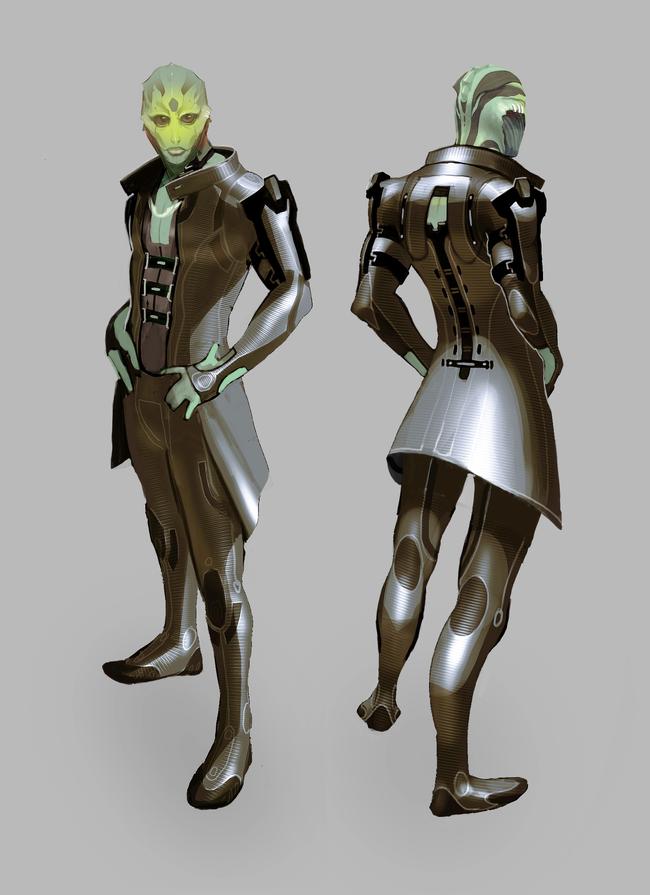
This system has been slightly improved in Mass Effect 2 with more dynamic movement in cutscenes even when a dialogue option is presented, but the main change in Mass Effect 2's dialogue trees come in the form of a new option - Interrupt.
Interrupt manifests itself in the form of a button prompt that will appear briefly during dialogue. Hitting the button in question will allow you to interrupt the person who is talking and take a more direct course of action. It's an interesting option, and the blink-and-you'll-miss-it quality of Interrupting ensures you pay as much attention to dialogue as you do combat.
The dialogue itself is impressive, and certainly some of the best-written material to grace a videogame. While Mass Effect 2 is constantly straddling sci-fi cliché, the real stand-outs here are the characters that populate the Mass Effect universe.
Almost every character you'll meet is impressively written, and while the core story of Mass Effect 2 can often feel like ground trodden in a million movies the cast - especially the party members - give it a wonderful new lease of life. The motivations, emotions and back stories of each and every cast member is wonderfully built, with each character wonderfully talented or skilled in one area but also drastically flawed in others. Aliens and Humans alike all feel like real, three-dimensional characters, and this is quite an achievement.
Outside of the cast the impressive stories continue, with even the tiniest side quest having clearly defined if often simple characters with interesting stories to tell.
Both the main and supporting casts have been voiced wonderfully by an all star cast. From the world of movies you've got the likes of Carrie-Ann Moss, Seth Green and Tricia Helfer putting in quality performances while video game regulars such as Mark Meer and Keith David take on meaty roles that make you wonder why they're not more famous.
The real triumph of Mass Effect 2's story is how it manages to make you care about what's going on. The wonderfully developed characters draw you in, but furthermore if you're coming from the first game with a wave you'll also be bringing across your custom Shepard and all the important decisions you made in the first game.
Characters that lived will return, while characters that bit the dust won't, and old acquaintances will speak to you in different ways depending on if and how you interacted with them in the first game. It's all very impressively pulled off, and certainly lives up to the expectations Bioware helped to stoke from before even the first game released.
Furthermore, the constant repercussions - sometimes small and sometimes massive - serve as a wonderful reminder that every decision you make in Mass Effect 2 will carry over to the third game in the series.
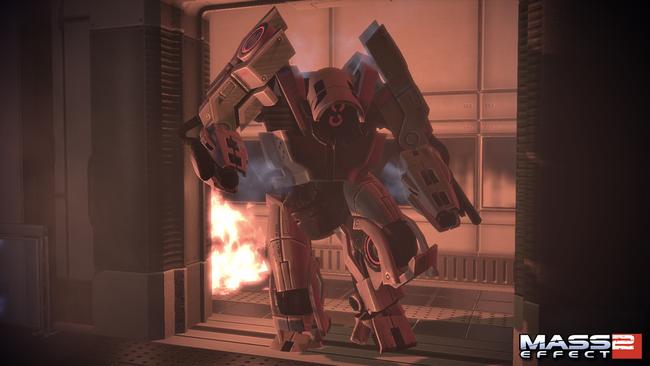
The well-rounded characters and exciting continuing story arc of the Mass Effect universe make for a tantalizing proposition, but the improved gameplay also plays a starring role in making Mass Effect 2 such a fantastic game.
The interesting thing about the approach Bioware took to this sequel isn't what they put in but actually what they yanked right out of the game for not being good enough. The hooky vehicle sections with difficult controls are gone, lengthy elevator rides are replaced by traditional but cool looking loading screens, and all that texture pop-in is gone, so a character's face won't suddenly become more detailed halfway through a vital cutscene.
As mentioned above, side quests are now unique affairs that all contribute something to the outcome at the end of the game. The cookie-cutter approach to side quest design is gone, with every mission packed with unique elements and important rewards.
While the core of many missions - fetch quests and combat missions - are similar, the surrounding plot and aesthetics are so different you'll often be compelled to play them. The days of walking round an unnamed base on an uncharted planet that is identical to every other one you've visited with generic dialogue are over.
Even the rubbish inventory system has been thrown out completely, with less equipment to juggle and all juggling left handled on your ship before you head out on a mission - once you're on the ground for a mission, swapping weapons and armor is impossible.
Streamlining the inventory system - a complaint from Mass Effect but also a staple of the RPG genre - is one brave move of many, including the introduction of 'reloading' for weapons rather than the first game's overheating system.
All these choices and more may prove controversial but actually serve to streamline the entire experience, refocusing the gameplay on its strengths rather than its weaknesses. Mass Effect 2 emphasizes what it's good at, and while some might bemoan the slimmed-down inventory and skill systems at first, extended play will actually reveal depth to match the first game beneath - and it's easier to use to boot!
While many of the classes were muddily explained in the first game, Mass Effect 2 clearly defines the abilities of each class and has them all now so unique that the gameplay experience will be completely different for an Engineer than it will for a Soldier. Class powers are devastating, and now guns are not the be-all end-all solution to every combat situation - in some situations they may even prove ineffective.
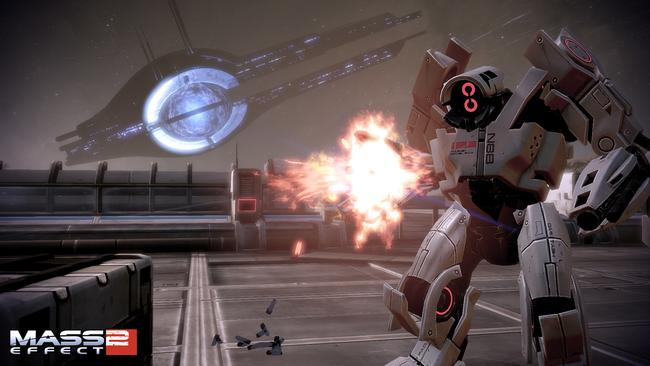
The better designed classes again reinforce the Bioware mantra of choice, and in Mass Effect 2 your choices of how to fight are just as important as what you do in the dialogue preceding the fight. Even your allies are more specialized in combat than they were in the first game.
Even the space exploration is improved, allowing you to scan uncharted worlds and collect resources from them which can be used to improve your ship or your equipment, and fuel and mining stations will appear on the galaxy map for you to visit.
Where Mass Effect was slightly overweight with plenty of potential, Mass Effect 2 is a trim, carefully toned being that has cut off a lot of the unnecessary fat in search of perfection - and Bioware have come incredibly close to it with this sequel.
The combat itself is largely the same; with the difference born from the new powers you're afforded. Everything has been made much slicker, though, with the animations in combat in particular receiving a massive upgrade which makes every bit of combat feel more real.
The guns feel more powerful when you fire them, with louder, sharper sound effects and the reload system also serves to make them feel closer to a dangerous projectile weapon than a futuristic blaster - and this tonally makes combat feel much different. Biotics are now more flashy and impressive, and the new Engineer powers are similarly improved.
Battles against larger enemies are now more frequent (and provide an ample chance to use the new heavy weapons) and the ease with which players can now trigger a skill, shoot and issue commands to allies has been improved, encouraging you to mix-up your approach to combat situations much more.
Like the first game there's definitely a learning curve to using the abilities, but Mass Effect 2 also does a better job of introducing the player to these elements slowly, rather than throwing them in at the deep end as the first game did.
Everything described here may make it sound like Mass Effect 2 is more of an action game than an RPG, but that's simply not true. The RPG elements are still absolutely core to the experience, with equipment management, character customization, leveling up and skill management all dictating exactly how the action-packed combat will play out.
The battle system is satisfying and fun, and while Action genre experience will definitely help RPG purists will still find plenty here to enjoy - and that's without even scratching the surface of the storyline role playing.
Mass Effect 2's RPG elements are difficult to describe, but it's hard after spending so much time with it to not imagine other RPGs adopting this style, taking the story and customization of RPGs and mashing it together with the action and speed of Action games to make something new, fresh and incredibly exciting.
Bioware's Dragon Age is clearly the more traditional of the two, but while Dragon Age offers old-fashioned thrills with new technology, Mass Effect 2 actually offers the best of both worlds, with the old evolving to match the new.
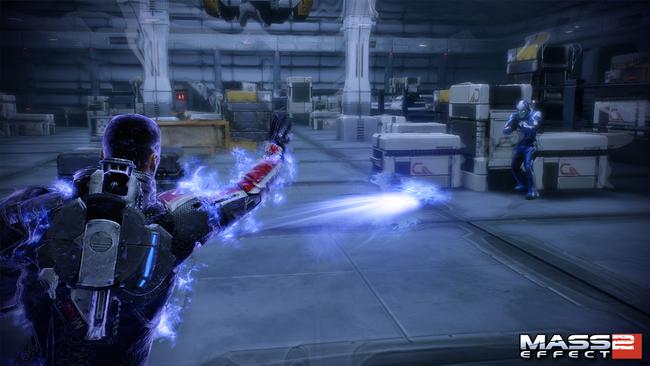
Jack Wall is on hand to provide another epic soundtrack mixing electronic with orchestra, and the overall graphical presentation of the game is beautiful. It has all the range you'd expect from a game with so many planets, from the lush greens of alien worlds to the cold metal of your ship - it's all very, very pretty and very meticulously designed.
No game is without fault, and as wonderful as it is, Mass Effect 2 has issues. Both versions of the game have some minor technical issues and sometimes the great script and voice acting give way and the occasional ham-fisted section gets through. Worst of all, on occasion there were some outright crashes.
None of these issues can put much of a dent in Mass Effect 2's achievement of being such a well-rounded, well built experience. Whatever area of the game you look at, you're bound to find something that will impress.
It is clearly a game that the team cared about and wanted to succeed, and as a result quality is evident in every scene in Mass Effect. It doesn't matter if it's the cinematic qualities of a minor side quest or the combat animations of a major boss - it's all been handled with love, care and dedication - I honestly believe you can feel it.
Mass Effect 2 is an incredibly ambitious game, and most developers would've balked at the idea of a sequel to a Triple-A blockbuster that fixed every error, dotted every i and crossed every t - but Bioware have succeeded.
It's a testament to their dedication and hard work, a testament to Bioware's status as one of the most important developers today, and a testament to what the RPG genre can still do. It's an awe-inspiring, cinematic, moving and deeply personal choice-driven epic – and likely to stand out in the future as one of the most important RPGs this generation.